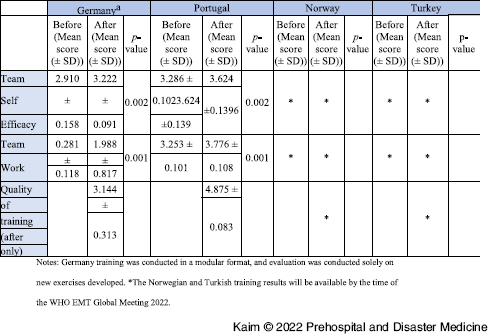No CrossRef data available.
Published online by Cambridge University Press: 22 November 2022
In the aftermath of disasters, Emergency Medical Teams (EMTs) are dispatched to help local rescue efforts. Although EMTs are recognized to be a critical component of the global health workforce, concerns have emerged over their functioning and effectiveness.1 For example, lack of cooperation and coordination between different EMTs has been a longstanding issue, resulting in fragmented disaster management.2 To enhance the provision of EMT’s field teamwork, the Training for Emergency Medical Teams and European Medical Corps (TEAMS) project was established,3 and later further updated with novel scenarios and exercises (ie, adapting EMT operations to a sudden disaster; becoming a modular team; reflecting on ethical dilemmas) in the complementary “TEAMS 3.0” project where a more comprehensive training package was developed.
The aim of this study was to assess the effectiveness and quality of the TEAMS 3.0 training package in four training programs in Portugal, Germany, Norway, and Turkey.
Participants completed a set of questionnaires designed to assess self-efficacy, teamwork, and quality of training.
The results from the Portugal and German training suggest an improvement for both teams’ self-efficacy and teamwork. The quality of training is regarded as high and deemed as an appropriate tool package for addressing the objectives of the project and the perceived needs of EMT disaster deployment.
Thus far, the TEAMS 3.0 project has demonstrated to be effective in promoting EMT teamwork capacities. The Norwegian and Turkish training results are expected to be available by the time of the WHO EMT Global Meeting 2022.
Tables and Figures (optional)
Table 1.
Comparison of Means Before and After the TEAMS 3.0 Training, per Country, for the Team Self-Efficacy Scale, Teamwork Scale, and Quality of Training Scale
